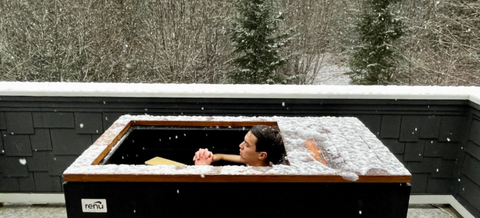Cold Water Immersion Basics
Cold water immersion (CWI), is a health routine aimed at delivering a host of physiological and mental health benefits. By exposing the body to a low temperature, people report faster muscle recovery, reduced inflammation, and lower levels of stress. Some choose cryotherapy, but most people prefer ice baths.
Going well beyond simple cold showers, cold hydrotherapy through full immersion is one of the best ways to naturally boost your health and wellness. In this article, we'll take a look at what effect cold exposure in an ice bath has on heart rate.
How Can Cold Water Therapy Affect the Cardiovascular System?
From blood flow to blood pressure, many athletes enjoy increased cardio capacity as a result of CWI treatment. To understand how and why CWI can affect heart rate, let's start by diving into how the cardiovascular system reacts to this form of cryotherapy.
Circulation
Through processes called vasoconstriction and vasodilation, immersion in cold water induces the opening and closing of blood vessels. This leads to improved pliability of the blood vessels, helping to boost circulation.
Blood Pressure
Another benefit of the frequent opening and closing of blood vessels throughout the body is improved blood pressure. When the circulatory system is more flexible and quick to respond, it does a better job of maintaining healthy blood pressure.
Performance
When the cardiovascular system is trained to be more responsive, it also leads to a boost in overall cardio performance. The heart can do a better job of speeding up and slowing down to match the effort of your workouts, so your endurance is enhanced, helping you achieve longer workout durations.
How is Heart Rate Affected by Cold Immersion Therapy?
Exposing the body to cold temperatures can help with everything from joint pain to metabolism. The response to sudden cold exposure creates numerous effects throughout each internal system.
One of the main systems that are affected is the cardiovascular system. Everything from blood vessels to breathing to heart rate produces responses when dunking in frigid water. So what might you expect when it comes to the heart rate aspect of these responses?
Heart Rate Variability Effects
One of the leading indicators of a healthy heart is heart rate variability. Essentially, this is a measurement of how much your heartbeat varies over the course of a minute. For example, while your heart rate might be 60bpm, it doesn't actually beat precisely one second apart—it only averages 60bpm over that span of time.
The important thing to remember is that you want a higher heart rate variability. Anywhere from around 40 to 100 HRV is a good range. Most notably, one study found that in less than a week, the HRV of participants was positively affected by cold water immersion sessions of only five minutes.
Reduced Resting Heart Rate
Another leading indicator of cardiac health is resting heart rate. Generally, the lower the rate, the better, with a number of 60bpm or less being optimal. When you regularly practice CWI, the cardiovascular system is trained to run more efficiently. This means lower resting heart rates over time.
Are there Risks Associated With Cold Water Immersion?
Of course, it's possible to get into hypothermia from exposure to freezing water for too long, potentially leading to drowning. This is why swimming in an ice-cold ocean, lake, stream, or river poses a severe risk.
CWI shouldn't be an exercise in survival, so avoiding these methods is wise. Instead, practice your immersions at home where you can completely control the water temperature and depth.
RENU Therapy tubs provide a comfortable seating position and ideal water depth, keeping you safe for the duration of your sessions.
What are the Guidelines for Cold Water Immersion?
To stay safe when taking your cold plunges, it's important to keep the water above 38º Fahrenheit and limit sessions to ten minutes or less. Also, always consult with your physician before beginning cold water immersion therapy.
RENU Therapy makes it easy to stay safe by providing simple temperature controls that ensure your water is always the ideal temperature. Our tubs can be set between 39ººF and 55ºF, making it a breeze to ease into daily CWI practice.
Enjoy the Benefits of Cold Water Immersion at Home
When you're searching for the best cold tub technology available, look no further than RENU Therapy. Our tubs are made from quality materials, are low maintenance, and deliver consistent cooling power. Our best-in-class filtration system always delivers cold and safe water without chlorine or other chemicals.
Get refreshing cold water with a plunge tub that's designed specifically to make CWI easy and effective.
Our cold therapy tubs are 100% made in the USA and come with the best warranty coverage on the market. We take pride in providing exceptional customer service with every CWI tank we sell! Browse our selection of beautifully-crafted cold water immersion tubs that will enhance your home's aesthetic appeal.
If you have questions, feel free to contact us at 714-617-2007 at RENU Therapy today!
















